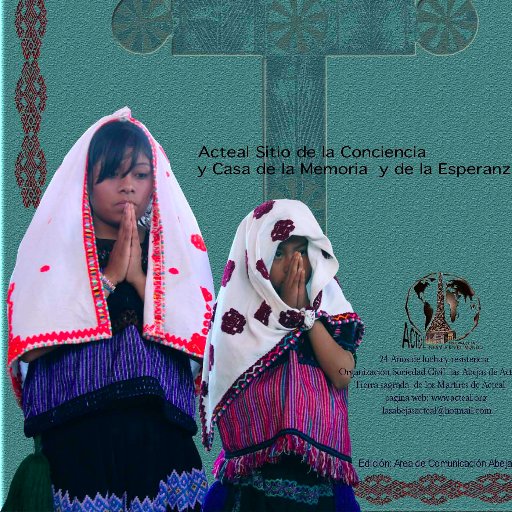Las Abejas: Remembering The Acteal Massacre (12/22/2016)
December 22, 2016, is the 19th anniversary of the Acteal massacre in Chiapas where 45 unarmed indigenous people were killed by 60 to 90 heavily armed paramilitary forces.

Waleska Cabrera --- December 22, 2016 marks the 19th anniversary of the Acteal massacre in Chiapas where 45 unarmed indigenous people were killed by 60 to 90 heavily armed paramilitary forces as they were praying in an outdoor chapel. The victims included 36 women and children, and 6 elderly persons, while 25 were wounded. All killed were members of Las Abejas ("The Bees"), a pacifist organization of Tzotzil Mayan Catholics, who identified with the non-violent defense of indigenous rights by Bishop Samuel Ruiz and his associates within the Diocese of San Cristobal. Las Abejas sought to fight against the forced displacement and militarism that indigenous communities were facing since the Zapatista (EZLN) uprising in 1994.
The Zapatista uprising had served as an inspiration for indigenous communities that sought to assert their autonomy and rights against the Mexican state that refused to recognize them. Even though Las Abejas were independent of the Zapatistas and maintained an explicit commitment to non-violence, the state viewed any Zapatista sympathizers as subversives. As a result, the Mexican state, aided with military assistance from the United States, targeted sympathizers as part of counter-insurgency strategy in Chiapas. It is no coincidence that the massacre occurred only a year after the San Andres Accords of 1996 which attempted to provide a legal framework for the peaceful resolution of Zapatista demands, and were signed by both the government and EZLN representatives.
The massacre revealed that despite the state's "participation" in peace accords, the state would never recognize the basic human rights and self-determination of indigenous peoples. In the aftermath of the massacre, Las Abejas not only repeatedly brought their case before the UN and Inter-American human rights systems but met with UN Secretary General Kofi Annan and UN human rights monitors. To date not a single individual or group has been investigated, prosecuted, sentenced or imprisoned regarding their massacre. Yet this has not silenced Las Abejas whose faith keeps them rooted in the search for justice.
The faith of Las Abejas, which draws upon their Catholicism and indigenous identity, places them within the context of liberation theology in Mexico. Liberation theology is the "preferential option for the poor;" a commitment to the people, who like Las Abejas, are resisting against poverty and injustice. Bishop Samuel Ruiz once said that "The Church, in the face of the peoples in the process of development, discovers what it is and what it must be: the Church of the poor, which is to say, the Church of all." When it isn't the Church of the poor it has failed in its mission for peace. That is why Las Abejas insistence on the eradication of poverty and injustice is so pivotal in the face of suffering in Chiapas. That is why on the 19th anniversary we must stand in resistance with Las Abejas, and all struggling for dignified life in Mexico and elsewhere.
